- Home
- Dan Millman
SACRED JOURNEY OF THE PEACEFUL WARRIOR Page 2
SACRED JOURNEY OF THE PEACEFUL WARRIOR Read online
Page 2
CHAPTER 2
The Journey
A ship is safe in harbor,
but that’s not what ships are for.
—John A. Sheed
RESTING BETWEEN HEAVEN AND EARTH, I gazed out the window of the 747, down into the blanket of clouds covering the Indian Ocean, and I wondered if the answers I sought lay somewhere below. As I watched these thoughts float by, my eyelids slowly closed.
Moments later it seemed, I was startled awake as the jet’s wheels touched down in the ancient land and bustling metropolis of Delhi. I had arrived in the humid monsoon season—constantly drenched by rain or sweat, I traveled by antique taxis, rickshaws, buses, and trains, then walked along muddy roads and through noisy bazaars where Hindu fakirs demonstrated unusual powers, disciplines, and austerities.
Days passed in dreamlike impressions of bright colors and strange scents as incense and cow dung blended in the oppressive heat. From Calcutta to Madras to Bombay, I moved among milling crowds. Sacred India, overburdened with bodies compressing into every square mile, every square foot, it seemed.
I found my way into numerous schools of yoga, where I learned a variety of postures, breathing systems, and meditations like those Socrates and Joseph had shown to me. In Calcutta, I saw the poorest of the poor, living in squalor. Everywhere I turned, I met beggars—men, women, crippled children in ragged clothing. Days later, in stark contrast to squalor, I stood on the bank of the Yamuna River in Agra, awestruck by the grandeur of the Taj Mahal and other temples of beauty and spiritual balance, as well as lesser-known ashrams potent with spiritual force.
On my pilgrimage I met sages speaking the ancient wisdom of Advaita Vedanta, a nondualistic philosophy which teaches that samsara and nirvana, flesh and spirit, are not separate, and whose holy trinity are Brahma the Creator, Vishnu the Sustainer, and Shiva the Destroyer. I also sat at the feet of gurus who spoke simple wisdom and emanated a loving and powerful presence. I felt the deep devotional fervor of the bhakta, of holy men and women. I trekked with Sherpa guides to Tibet, Nepal, breathing the rarefied air; I sat in caves and meditated.
But as the weeks passed, I grew more dejected, because I never found anyone like Socrates, nor did I learn anything that wasn’t available in a West Coast bookstore. I felt as if I’d gone searching for the secrets of the East only to discover that the “East” had apparently moved to California.
I have the greatest respect for the spiritual traditions of India; I honor its cultural heritage and human treasures. But everywhere I went, I felt as if I were on the outside looking in, fishing in an empty pond. It wasn’t India’s failing; it was mine. After five weeks, disheartened but resolute, I decided to return home and try to put my broken family life back together. It was the right thing to do, the responsible thing. I would take the eastern route home, flying from India to Hawaii for a few days rest, then back to Ohio—to my wife and daughter. Somehow, I thought, things might still work out. Maybe coming up empty in India was a sign that my time with Socrates was all the spiritual training I was meant to have.
But if that were true, I thought, why is this restless feeling growing stronger?
The departing jet flew through the night, its wing lights flashing like tiny stars as we passed over a sleeping world. I tried to read but couldn’t concentrate. I tried to sleep but dreams assailed me. Socrates’ face kept popping up, along with fragments of things said long ago. By the time we landed in Hawaii, the “pay-attention-there’s-something-you’re-missing” feeling became intolerable, like a fire in my belly. I felt like screaming, What am I supposed to do?
AS I CLEARED CUSTOMS and emerged, stretching, into the bright sun, the moist Hawaiian breezes soothed me, at least for the moment. Legend had it that these islands—born of earth, air, fire, and water—radiated a powerful healing energy long before sailors, priests, developers, and history opened Hawaii as a tourist attraction. I hoped that beneath the veneer of civilization some of the healing energy remained, and that it might quiet that barking dog inside me that wouldn’t let up.
After a snack at the airport, a noisy bus ride through the busy streets of Waikiki, and an hour on foot, I found a small room off the beaten path. I tested the leaky toilet, then quickly unpacked the few belongings I’d stored in my old backpack. The half-open drawer of the nightstand revealed a dog-eared phone directory and a barely used Bible. It would do for a few days.
Suddenly tired, I lay back on the squeaky, sagging mattress, and I remembered nothing more—until my eyes snapped open and I jolted upright. “The woman shaman!” I yelled out loud, half-asleep, hardly knowing what I was saying. Then my brain awoke fully. “How could I have forgotten?” I pounded my forehead. “Think!” What had Socrates told me? First one memory surfaced, then another. He had urged me to find someone in Hawaii, and he had mentioned a school in—where was it?—Japan? China? And … something about a book or volume from a journal he had lost in the desert.
One day I might find that journal. But first I had to find the woman. Of course—that’s why I’m here I realized; that’s the sense of destiny that had been gnawing at my insides. Finally, I knew the real reason I’d taken this journey. It was as if I’d been wandering, lost in a forest, then stumbled back onto the path. Once this fell into place, my belly relaxed, and the ache changed to excitement. I could hardly contain my energy. My mind raced: What had he told me about the woman? She had written to him on some kind of stationery—bank stationery, that was it!
I grabbed the yellow pages and looked up “banks”; I counted twenty-two of them in Honolulu alone. “Who am I kidding?” I muttered to myself. He hadn’t told me her name or address, or what she looked like. I had almost nothing to go on. It seemed impossible.
Then the sense of destiny filled me again. No, this couldn’t all be for nothing. I was here, and somehow I would find her. I looked at my watch. If I rushed, I could check out a few banks before closing time.
But this was Hawaii, not New York City; people here didn’t rush anywhere. And what would I do at the first bank anyway—walk in wearing a signboard that said, “Looking for someone special”? Would I whisper, “Socrates sent me” to every teller? I could only hope that somehow this woman might recognize the name I had given him—if she still worked at a bank, if she existed at all.
I stared out the window at a brick wall across the alley. The beach was only ten blocks away; I’d get some dinner, go for a walk in the sand, and decide what to do. I made it to the water’s edge just in time for sunset, only to realize that the sun set on the western side of the island, and I was on the eastern shore. “Terrific,” I said under my breath. “How am I going to find my mystery woman if I can’t even find the sunset?”
I lay down on the soft sand, still warm in the evening air, and gazed up at a palm tree overhead. Watching its green fronds swaying in the soft breeze, I searched through my mind for a plan.
The next day, as I walked by the office of a local newspaper, it came to me. I entered the building, and quickly composed an ad to appear in the “Personals” column. It read: “Young friend of Socrates, seeking like-minded female banker. Let’s make change together.” I added my motel phone number. Probably a lame idea, with about the same odds of success as stuffing a note in a bottle and tossing it into the sea. A long shot, but at least a chance.
SEVERAL DAYS PASSED. I visited art galleries, went snorkeling, and lay on the beach—waiting, just waiting. My personal ad had come up empty, and pounding the pavement seemed like an exercise in futility. Discouraged, I called the airport and booked a flight home. I was ready to call it quits.
On the bus ride to the airport, I sat in a kind of stupor, unaware of my surroundings. I found myself standing in front of the airline counter. Then, in the boarding lounge, as the agent called my flight, a voice inside me said, No. And I knew I couldn’t give up. Not now, not ever. I had to find this woman, the link between my past and future.
I canceled my flight, bought a city map, and caught the next bus
back to Honolulu. On the way, I marked the location of every bank on my list.
THE FIRST BANK, featuring generic bank decor, was nearly empty at this time of day. Scanning the room, I spotted a good possibility—a slender, athletic-looking woman, maybe in her late forties. She turned and gave me a brief smile. When our eyes met, I experienced a flash of intuition—this was incredible! Why hadn’t I trusted myself from the start? She finished talking to one of the bank officers and returned to her desk by the safety deposit boxes and the vault. I waited patiently for the right moment; then, taking a deep breath, I walked up to her.
“Excuse me,” I said, wearing my brightest, clearest, most alert smile so I wouldn’t appear totally crazy. “I’m looking for a woman—no, let me rephrase that—I’m looking for someone who happens to be female, but I don’t know her name. You see, an old gentleman—well, he’s not exactly a gentleman—uh, an old man named Socrates suggested I find her. Does that name mean anything to you?”
“Socrates?” she said. “Isn’t he a Greek or Roman guy—in history?”
“Yes, he is—was—” I answered, my hope dampened. “Maybe you don’t know him by that name. He’s a teacher of mine; I met him in a gas station,” I whispered emphatically, “a gas station in California.” Then I waited, and held my breath.
Slowly, her eyes grew wider and then a light went on. “Yes! I had a boyfriend once who worked in a station in California. But his name was Ralph. So you think it could have been Ralph?”
“Uh, no,” I answered, disappointed. “I don’t think so.”
“Yeah, well, I gotta get back to work. I hope you find Archimedes—”
“Socrates,” I corrected her. “And I’m not looking for him. I’m looking for a woman!”
I felt a chill, and her tone shifted. “Excuse me, please. I hope you find a woman soon.”
I felt her gaze on the back of my neck as I walked over to another bank employee and did a variation of the same routine with a woman about fifty years old wearing heavy pancake makeup and rouge. Not a likely candidate, but I had to be thorough. She exchanged glances with the first teller, then looked back at me, her eyes filled with suspicion. “Can I help you?” she asked.
They must learn some kind of bank telepathy, I thought.
“I’m looking for a woman who works at the bank,” I explained, “but I’ve misplaced her name. You wouldn’t happen to know anyone named Socrates—”
“Perhaps you’d better talk to an officer,” she interrupted. At first I thought she was referring to a security officer, but she pointed to a third woman in a dark suit, sitting behind a desk, just getting off the phone.
With a quick nod of thanks, I walked over to the officer, looked her in the eyes, and declared, “Hi, I’m a peaceful warrior looking for a friend of Socrates.”
“What?” she replied, glancing toward the security guard.
“I said I’m a potential customer looking for a fund of securities.”
“Oh,” she said, smiling and straightening her coat. “Then I think we can help you.”
“Oh gosh, will you look at the time!” I said, looking at my watch. “I’ll get back to you. We’ll do lunch. Good-bye, ciao, cheers, aloha.” I left.
I used the same peaceful warrior/potential customer line the rest of the afternoon. Then I found a bar and had my first beer in a long time. And I don’t even like beer. As I walked through the crowded streets of downtown Honolulu, I thought about the woman, and realized she would have to be considerably older than forty or fifty or even sixty. If Socrates had really been in his nineties, as he claimed, she would have to be in her late seventies. Almost certainly retired, I thought, disheartened. Still, someone might know, might remember her.
Eight banks later, I sat against the wall of yet another institution of higher finance and reminded myself, Never, ever, even think about becoming a private investigator. My back ached and I felt like I was developing an ulcer. The whole thing seemed crazy. Maybe someone had given the woman the bank stationery. Why would a shaman work at a bank? But, then, why would an old warrior like Socrates choose to work at a gas station?
More confused and discouraged than ever, I had no more illusions about magically bumping into a shaman in a bank who would immediately recognize me as her prodigal son. Any remaining faith in my intuition was smashed as flat as the soda can near me on the sidewalk. I picked it up, stood, and tossed the can in the trash—a good deed. At least the entire day wouldn’t be wasted.
The next day, I made the rounds at another ten banks until, exhausted and numb, I could do no more. I was asked to leave by the security guard at two savings and loans and almost got arrested at the last bank when I became belligerent. My nerves frazzled, I decided to call it a day.
That night, I dreamed I kept walking right past the woman I was seeking, narrowly missing her—like a scene in the movies when the two main characters are about to meet but turn their backs at the last minute and miss each other. This scene kept repeating itself in a maddening series of retakes.
I woke up tired. I was ready and willing to do anything that day—anything at all—except search for a nameless female bank employee. But somehow—and here my training with Socrates really paid off—I willed myself to get up, get dressed, and get going. Little disciplines like that can make all the difference in the world.
The following day tested my limits. I did find one bright spot, however, an oasis in a sea of frowning faces: At the fourth bank of the day, I met an extraordinarily pretty teller, about my age. When I told her I was looking for a specific woman, she asked, with a dimpled smile, “Am I specific enough?”
“I … uh … as a matter of fact, you are one of the most specific women I’ve seen in a long time.” I grinned. I certainly doubted she was the woman shaman, but stranger things had happened, and with Socrates—well, you never knew.
She stared into my eyes, as if waiting for something. Maybe she was just flirting. Maybe she wanted me to make a deposit in her bank. Or maybe she knew something. For all I knew, she could be the shaman’s daughter. Or something. I couldn’t afford to pass up any lead, I told myself. Anyway, I could stand a little fun.
“Do you know who I am?” I asked.
“You look familiar,” she answered.
Damn. Did she know or didn’t she? “Look, uh,” I glanced at her nameplate on the counter, “Barbara. My name’s Dan; I’m a college professor visiting Honolulu, and well, it’s kind of lonely, vacationing by yourself. I know we just met, but would you consider having dinner with me after work? Maybe you could show me where the sun sets, or we could talk about gas stations and old teachers.”
She smiled again—definitely a good sign. “If that’s a line,” she said, “at least it’s original. I get off at five; I’ll meet you out front.”
“Hey, that’s terrific! See you then.”
I walked out of the bank feeling good. I had a date, maybe even a lead. But then why did a little voice inside me say, “Idiot! What are you doing? Socrates sends you on a quest and you pick up a bank teller?”
“Oh, shut up!” I said aloud as a passerby turned and gave me a look.
My watch read 2:35. I could still make it to two, maybe three more banks before five o’clock. I looked at my street map, now speckled with crossed-out bank sites; the First Bank of Hawaii was right around the corner.
CHAPTER 3
Fool’s Gold
When one is willing and eager, the gods join in.
—Aeschylus
AS SOON AS I ENTERED THE LOBBY, the guard glanced in my direction, started toward me, then walked right by; I let out my breath and glanced up at the cameras; they all seemed focused on me. With a businesslike air, I walked over to a counter, pretended to fill out a deposit slip, and cased the joint.
A few feet away sat a functional desk, behind which sat a functional bank officer—a tall, aristocratic-looking woman in her fifties. She glanced up at me as I approached. But before I could ask her anything, she stood up. “
I’m sorry—I’m taking a late lunch—but I think Mrs. Kaneoha can help you,” she said, pointing back toward the other desk. Then she turned, and left.
“Uh, thanks,” I mumbled after her.
Mrs. Kaneoha offered no help, nor did any of the other tellers or officers at that or the next bank, where I was helped outside by the security officer, who invited me not to come back.
Ready to laugh—or cry—I slumped against the last bank’s polished stone exterior and slid to a sitting position on the sidewalk. “I’ve had it,” I said out loud. “That’s it, forget it, no more banks.”
I understood the importance of persevering, but there’s a point to stop banging your head against a wall. And this just wasn’t working out. I would go on my date, watch the sun set, and then head back to Ohio.
As I sat there feeling sorry for myself, I heard a voice ask, “Are you all right?” I looked up to see a small but plump Asian woman with silver hair, wearing an oversized muumuu, holding a bamboo cane. She looked about seventy years old—maybe older. She smiled down at me with an expression of maternal concern.

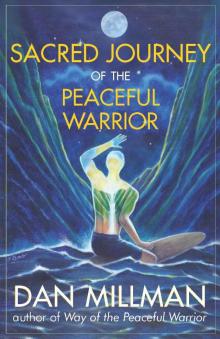 SACRED JOURNEY OF THE PEACEFUL WARRIOR
SACRED JOURNEY OF THE PEACEFUL WARRIOR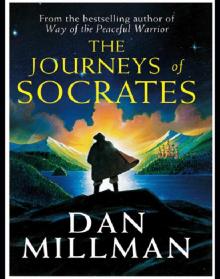 The Journeys of Socrates: An Adventure
The Journeys of Socrates: An Adventure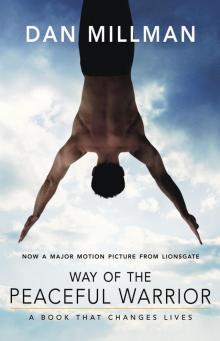 WAY OF THE PEACEFUL WARRIOR: A Book That Changes Lives
WAY OF THE PEACEFUL WARRIOR: A Book That Changes Lives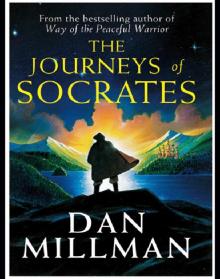 The Journeys of Socrates
The Journeys of Socrates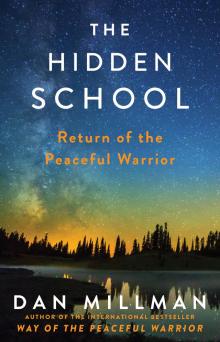 The Hidden School
The Hidden School